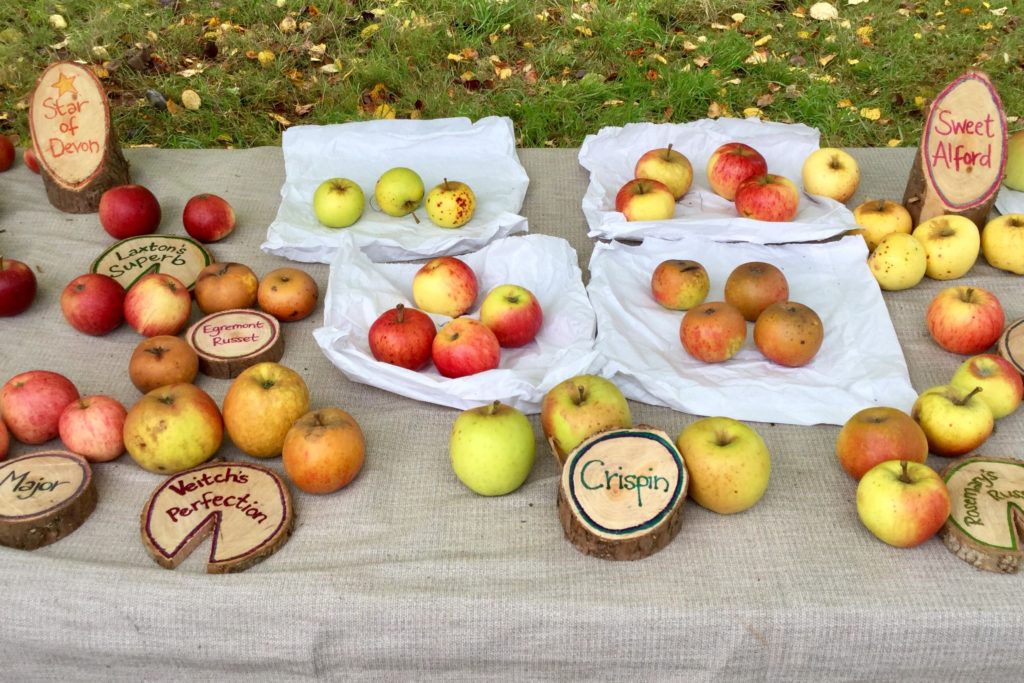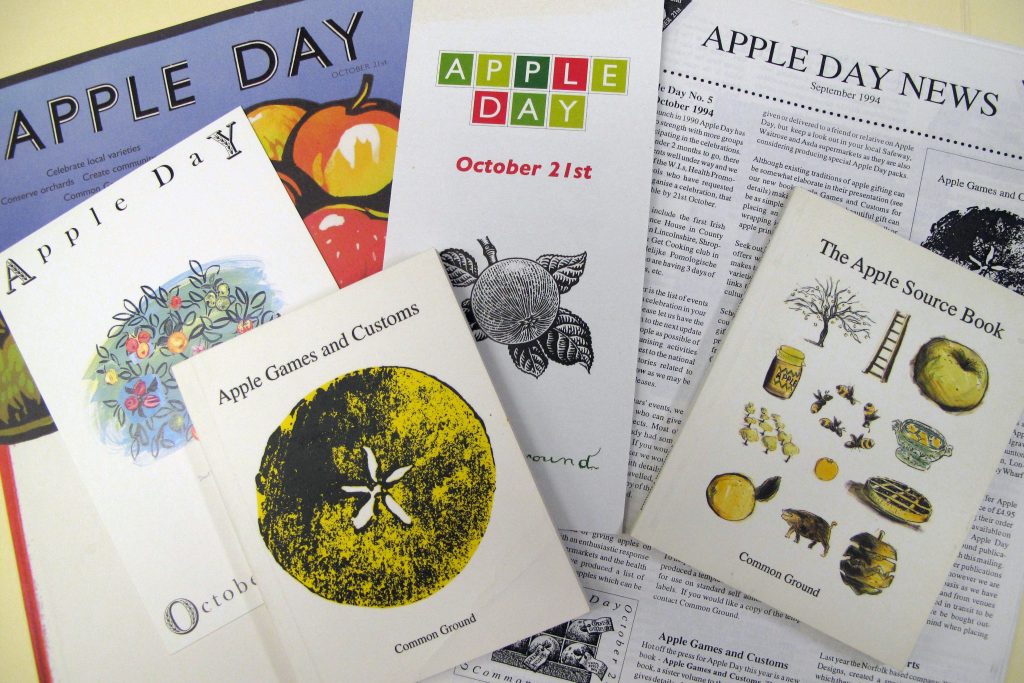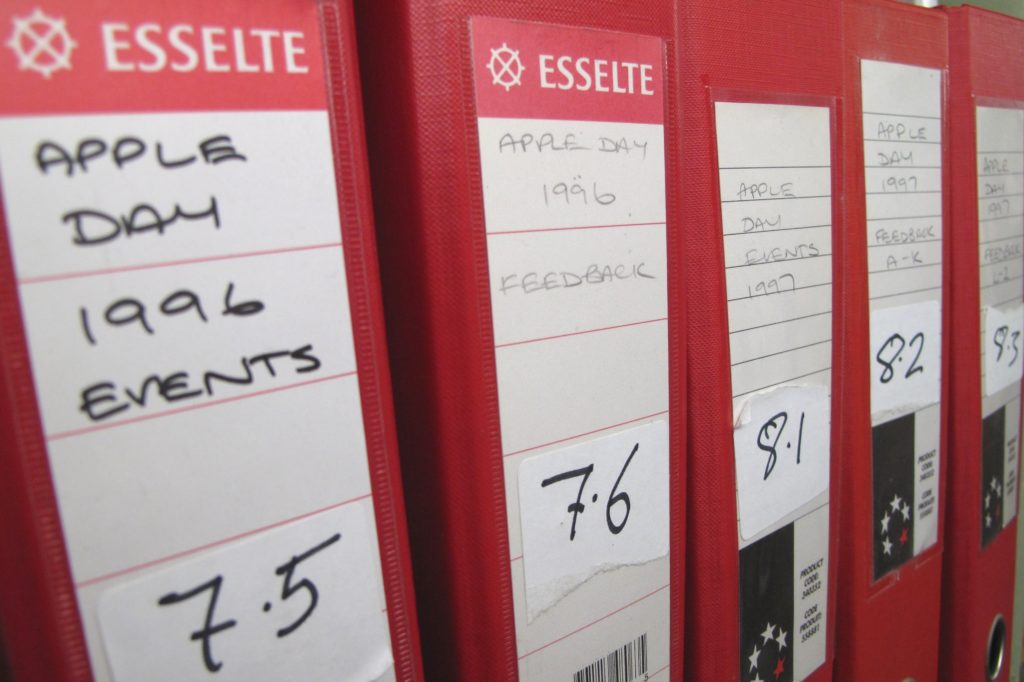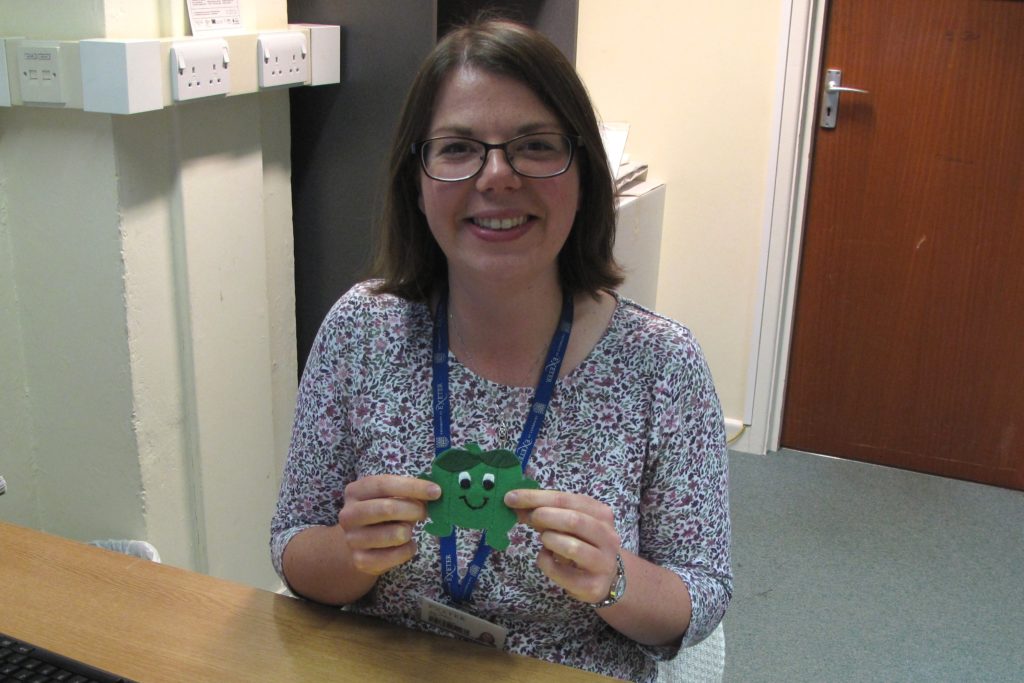Warning: may contain puns
Every year on and around the 21 October, apples and orchards are celebrated in the UK as part of a custom known as Apple Day. Indeed, Apple Day has become so firmly entrenched in the British calendar that it could easily be believed to be an ancient tradition. However, Apple Day has only officially been celebrated on 21 October in the UK since 1990, when the arts and environmental charity, Common Ground, initiated its very first ‘fruitful’ – in all senses of the word – celebration of apples in the Plaza of Covent Garden in London.
The Common Ground archive, which has been in the care of Special Collections at the University of Exeter since 2013, contains a significant amount of material created and collected by Common Ground throughout the course of the Apple Day project. The richness of this material offers a tantalising opportunity to delve into the archive and explore the history behind the ‘fruits’ of Common Ground’s labour – and as I am currently in the process of surveying the archive before the cataloguing begins, that is exactly what I did.

Author’s own photograph of apple varieties on display, taken at Killerton Apple Festival in Exeter, 2018
In 1987, Sue Clifford and Angela King at Common Ground became aware of the sharp decline in traditional orchards in the British Isles since the 1950s whilst conducting research for the Trees, Woods and the Green Man project. They recognised that this decline not only had an ecological impact on the British landscape, but also signified a loss of associated cultural practices. Not only would we lose regional fruit varieties, local distinctiveness, and richness of wildlife, but knowledge of recipes, stories, songs, and skills such as planting, grafting and pruning would also diminish. To raise awareness of this issue, the charity launched its Save Our Orchards and Community Orchards campaigns, which sought to encourage and ‘a-peel’ to people to protect traditional orchards, as well as create new community orchards.
Realising it was ‘crunch’ time for orchards, in 1990, Common Ground introduced a new initiative to further protect and promote the ecological and cultural importance of orchards – a calendar custom which it named Apple Day. The charity hoped that demonstration and celebration of the apple – with its thousands of varieties, and rich history and symbolism – could raise awareness of the orchards in danger of being lost, as well as inspire real positive change in the way that people source food and engage with their local environment. The first Apple Day celebration was organised by Common Ground with forty stalls in Covent Garden in 1990.

Apple Day promotional material and apple-related publications produced by Common Ground in the archive
Common Ground initiates and manages projects that inspire people to care for and forge meaningful connections with their local environment through the arts, and which – perhaps most importantly – are sustainable. In this vein, having piloted Apple Day in London with great success in 1990, in the following year the charity encouraged people nationwide to organise their own apple-related events on and around 21 October. The initiative soon ‘bore fruit’ and Common Ground took on an advisory and promotional role towards Apple Day, supporting the increasing number of local organisers in coordinating their own events. This continued until 2010 – the 21st Apple Day and year the custom officially ‘came of age’ – at which point Common Ground considered the day to have so firmly ‘taken root’ in the British calendar that it was capable of continuing without extra support from the charity. In addition to supporting local organisers, Common Ground published several books relating to apples, including: ‘The Apple Source Book’ (1991, 2007) and ‘Apple Games and Customs’ (1994) in the course of the project.
Apple Day events have been organised across the length and breadth of the country by villages, community groups, councils, historic houses, museums, arts centres, pubs, restaurants, agricultural colleges, hospitals, schools, wildlife trusts, tree nurseries, markets, farms, and commercial and community orchards – phew! – and from its inception has risen from one to hundreds of events nationwide every year. An Apple Day event can incorporate all kinds of different activities, such as displays, identification, and pressing of local varieties of apple; sampling and sale of orchard produce; tours of and talks about orchards; as well as music, crafts and games, including wassailing, apple bobbing, and the longest apple peel competition.

The Apple Day material in the archive is currently organised into clearly labelled folders
The recent survey I conducted of material in the archive relating to Apple Day provided me with a good overview of the contents and order of this section. The material in this section of the archive is generally well-organised (always ‘apple-easing’ sight for an archivist!) into files arranged by year and record type, and comprises correspondence, newsletters, promotional material, photographs, press clippings, reports, research material, and notes. The papers that I personally found most interesting were those sent between Common Ground and Apple Day organisers between 1991 and 2010, which include letters, event information forms, and feedback forms. When studied together, these papers provide fascinating insight into the development, success, and geographic distribution of Apple Day events across the British Isles. Other items that I found particularly delightful were examples of crafts made at Apple Day events, which include an apple crown made by schoolchildren and a felt finger puppet in the shape of an apple.

An apple finger puppet found in the Common Ground archive
Exploring the history of Apple Day in the Common Ground archive has been ‘apple-easure’, and I’m already looking forward to cataloguing this section and making it more accessible for researchers via our online catalogue.
In the meantime, I hope you have a very happy Apple Day this year and every year – may it continue ‘apple-y’ ever after!
By Annie, Project Archivist
Cataloguing Update
This section of the archive was catalogued in October 2021. You can find the full catalogue description for the Apple Day section here. You can find out more about the cataloguing process and the Apple Day archive material in our blog post: Cataloguing the Common Ground archive: Orchards and Apple Day.